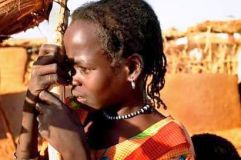UNICEF: Solution needed in Darfur; 3 million children at risk
Dec 20, 2005 (LONDON) — The U.N. children’s agency pressed Tuesday for fighting to end in Sudan’s Darfur region, saying the future of 3 million children was at stake.
 “Darfur’s children have borne the brunt of this crisis and their long-term prospects appear bleaker with every day that passes without a lasting solution,” UNICEF said in a report aimed at drawing attention to the impact of war on the most vulnerable as politicians try to negotiate a solution in talks mediated by the African Union in Abuja, Nigeria.
“Darfur’s children have borne the brunt of this crisis and their long-term prospects appear bleaker with every day that passes without a lasting solution,” UNICEF said in a report aimed at drawing attention to the impact of war on the most vulnerable as politicians try to negotiate a solution in talks mediated by the African Union in Abuja, Nigeria.
“Abuja needs to succeed, we need to have a political solution,” Ted Chaiban, head of UNICEF in Sudan, said in a telephone interview from the capital, Khartoum.
Chaiban said that besides hoping to influence the negotiators in Abuja, where several rounds of talks have been inconclusive, UNICEF wanted to remind a world that appears increasingly weary of crises in Africa of the continued need to fund humanitarian relief and an African Union peacekeeping mission in Darfur.
UNICEF estimates that more than 1 million of the 2 million displaced since Darfur’s civil war broke out almost three years ago are under 18, and 320,000 of those are younger than five. Hundreds of thousands of others have not even made it to the temporary haven of aid camps.
The report, released simultaneously in London and Khartoum, recounts progress made in ensuring those displaced get food, shelter, medical care and education in camps in Sudan and in neighboring Chad. But security remained a concern, with women and girls risking rape when they venture outside the camps for water or cooking fuel.
UNICEF added that while 1.75 million children live in and around the camps, another 1.25 million live in areas made inaccessible by fighting, banditry and other obstacles. “Hunger, thirst and extreme hardship looms for those currently beyond the reach of humanitarian relief,” the report said.
Chaiban said UNICEF appealed for $123 million for its Darfur programs in 2005 and received less than half of that.
“It was enough to stabilize things, but we need to look at how we can do more,” said Chaiban, who recently toured Darfur.
UNICEF has requested $89 million for Darfur for 2006, and so far had received very little.
“We have enough resources to start the year and probably cover January and February,” Chaiban said. “But after that we have no more resources.”
The African Union, which has 7,000 peacekeepers in Darfur, said last week it would run out of money for the mission within four months unless it finds more funding.
Chaiban said it “would be a terrible situation” if the A.U. was forced to scale down or retreat from Darfur.
After years of skirmishes over resources between Darfur’s herding and farming communities, large-scale fighting broke out in February 2003. Two ethnic African rebel groups took up arms, accusing the Arab-dominated government of repression and unfair distribution of wealth.
The government is accused of responding by unleashing ethnic Arab militia known as the Janjaweed against civilians.
(AP/ST)
